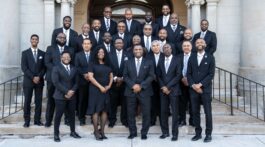Sabbath School Lesson for April 1-7, 2017
It is believed that Peter wrote his two epistles during his time in Rome, where it’s traditionally thought he spent his last years of life. The first epistle appears to express a desire to help his fellow believers when persecution seemed to be escalating in the Roman Empire. This would be shortly before the outbreak of persecution that occurred under Emperor Nero in A.D. 64.
Therefore, the first epistle tends to focus more on outside forces of evil, whereas the second epistle addresses inside threats and heresies that were also beginning to emerge in the early church.
Peter seems intent on helping “pilgrims”, as he called them in his introduction, by providing them with words of hope and comfort. We also find his words admonish them to fulfill their heavenly calling to spread the gospel and live pure, holy lives for God.
Scripture Gem: “Now that you have purified yourselves by obeying the truth so that you have sincere love for each other, love one another deeply, from the heart.” 1 Peter 1:22 NKJV
This verse sounds reminiscent of Christ’s words, spoken many times, to “Love your neighbor as yourself.” We love God through loving ourselves by being pure and obedient before God, but also by sincerely loving others.
Here’s how this first epistle of Peter is presented to us:
- The first chapter of Peter’s epistle introduces us to the principle of our salvation by Jesus Christ (1 Peter 1:1-2:12).
- Then we explore the topic of submission (ch. 2:13–3:12).
- Finally, we’re brought to the theme that involves suffering of the believer (ch. 3:13-5:14).
Sunday: To the Exiles
The first verse of 1 Peter leaves no doubt as to the author. As the custom, Peter addresses his audience by first identifying himself as an apostle of Jesus Christ. There, and continuing in the second verse, his intended audience is revealed.
“Peter, an apostle of Jesus Christ. To the pilgrims of the Dispersion in Pontus Galatia, Cappadocia, Asia, and Bithynia, elect according to the foreknowledge of God the Father, in sanctification of the Spirit, for obedience and sprinkling of the blood of Jesus Christ: Grace to you and peace be multiplied.” 1 Peter 1:1, 2 NKJV
These regions of Asia Minor are said to include the eastern part of Turkey, where no doubt, many Jewish exiles were living at the time of Peter. Debate remains as to whether Peter had both Jews and Gentiles in mind as he wrote. But some of his statements and actions indicate that Gentiles may have been included in his words of comfort and instruction.
He and Paul seem to be in basic agreement that “if you are Christ’s, then you are Abraham’s seed, and heirs according to the promise.” (Galatians 3:29 NKJV) As often true for people brought up with strict traditions and cultural restraints, however, it is sometimes difficult to be loving to those you’ve been taught were your enemies.
Peter though seems adamant about breaking down barriers and loving others, not just in word, but “deeply, from the heart,” as our Scripture Gem points out.
Discussion Questions: Read 1 Peter 1:1, Galatians 1:1, Romans 1:1, and Ephesians 1:1. Why do you think Peter’s introduction was simpler and more straightforward than Paul’s? How were their backgrounds similar and how were they different?
Read 1 Peter 1:1, 2. What word choices here make you think Christian Jews were being addressed?
Read 1 Peter 1:18, 2: 12, and 4:3. How might these statements be inclusive of Gentile followers, as opposed to those only with a Jewish background?
Monday: Elected
Much confusion remains about who is included in the term “elect”, as Peter refers to his audience in verse 2 of 1 Peter. As already examined, it seems likely that the term was meant to include all believers, Jews and Gentiles alike.
Relatively recently, however, many Christians have come to believe that Israel is still God’s chosen, and will somehow rise up and fulfill God’s mission at the end of the earth’s history. A closer examination of Bible prophecy, however, seems to reveal that this doctrine is questionable.
Of course, there has also been those who callously believe that all Jews are under condemnation, especially in earlier generations than ours. But we, of course, know that God still works in Jewish populations, and we’ve seen many of them come to know Jesus Christ as their Messiah. So this theory also adds to the confusion.
As Satan would have it, both erroneous ideas have clouded the meaning of who the “elect” are, but one can’t help but feel that Peter was not confused about God’s chosen, as he set out to minister to the early Christians wherever he found them.
Discussion Questions: Read 1 Peter 1:2, Acts 2:23, and Ephesians 1:4. What is God’s original purpose for all of us, according to Paul’s letter to the Ephesians? How is the foreknowledge of God different from predestination or predetermination, a theory that still causes confusion in many believers? Have our individual fates already been decided before the world began? Why is this predestination a dangerous doctrine?
Read 1 Timothy 2:4, 2 Peter 3:9, and Ezekiel 33:11. How inclusive is God’s desire to save us? How does John 3:16, probably the most well-known text in Scripture, uphold this belief? How does this understanding help us know who the “elect” were in Peter’s letters?
Read Hebrews 10:22 and 12:24. How does Paul add to our understanding of the blood, mentioned by Peter in his introduction? What does the “blood” do for us, both Jews and Gentiles?
Tuesday: Key Themes
Moving on from Peter’s introduction, we see that his first topic of discussion was about their heavenly reward, their God-given inheritance that was waiting for them. Knowing some of the trials that the church endured during this time, it is understandable that this would be Peter’s first message to them.
He also reminded them of Jesus’ resurrection, which made theirs a living hope, uniquely different from all religions of the world. The One they worship is ALIVE. Peter was a witness to that resurrection and ascension event, and therefore passionate about sharing it with all who would listen. It was the sure and steady basis for their hope in the future, which would someday reunite them with their loving Savior.
Here is the progression of ideas brought out in 1 Peter 1:3-12:
- There is a Father, Son, and Holy Spirit blessing us with a living hope. (all three of them being mentioned in verse 3)
- There is a new birth experience that gives us that hope. (also found in verse 3)
- There is a heavenly reward for those who have this hope. (verses 4 and 5)
- There is a reason to rejoice in our trials, because of the hope we have found in Jesus. (verses 6-9)
- There is a need to listen to the prophets and apostles, who have experienced firsthand the reality of this hope. (verses 10-12)
Discussion Questions: Read 1 Peter 1:2-9. After mentioning all three members of the godhead in verse 2, what do we learn about the Father and Son from the remainder of the passage?
Read 1 Peter 1:10-12. What do we learn about the Holy Spirit from these verses?
Read 1 Peter 1:4. How uplifting would it have been to the early Christians to know that there was an inheritance reserved just for them in heaven? Does God also have a special place in heaven reserved for each of us individually now? How does this awareness affect our relationship with God?
Wednesday: Living the Life of Salvation
After our reminder of who the Father, Son, and Holy Spirit are and what they represent in the first part of the chapter, Peter continues his letter with solid reasons to live a life that glorifies God.
We find certain themes presented in verse 13, which introduces us to Peter’s shift to discussing how to live as a Christian should…
“Therefore gird up the loins of your mind (you will need to do this in order to be holy),
be sober (you will need to remember that God is our judge),
and rest your hope fully upon the grace that is to be brought to you at the revelation of Jesus Christ;” (you will need to focus on the price Jesus paid for you) 1 Peter 1:13 NKJV
The things that motivate our Christian behavior then should be…
- the fact that God is holy (verses 14-16)
- the fact that God will judge us (verse 17)
- the fact that Jesus died for us (verses 18-21)
Discussion Questions: Read 1 Peter 1:13 and Ephesians 6:14. How does an examination of both these verses help us understand more fully what Peter is asking us to do? What part does the mind play here? The truth?
Read 1 Peter 1:15-16, Leviticus 19:2, and 20:7. What does consecration (or dedication) have to do with being holy?
Read 1 Peter 1:17 and Acts 10:34. When was Peter shown that God’s judgment is truly without partiality? How should that affect how we treat one another?
Thursday: Love One Another
Peter closes this portion of his letter, which we have designated as chapter 1, with an appeal for fervent love for each other. He refers to them as “brethren”, a term Jesus also used for all who believe in Him (Matthew 23:8)
The designation “brethren” seems quite appropriate when discussing our inheritance. After all, we are joint-heirs with Christ. It stands to reason that we would be considered “brothers” and “sisters” in the Lord. This is family love at its best.
Close to his plea for brotherly/sisterly love is a reference to being “born again” (v. 23). Peter obviously realizes that only after a born-again experience can one show the kind of love that God prefers we have for each other.
The Greek language provides several words for “love”. There is:
- friendship (called “philia” love)
- passionate feelings felt by husbands and wives (called “eros” love)
- pure, holy love that seeks the good of the other (called “agape” love)
This highest level of love, called agape in Peter’s letter, is the one he speaks about in his epistle.
Peter then immediately reminds them to stay in the Word, the enduring Word of God. He uses a quote from Isaiah to support the eternal nature of the gospel. “…the grass withers, the flower fades, but the word of our God stands forever.” Isaiah 40:8 NKJV
Discussion Questions: Read 1 Peter 1:22, Luke 8:21, and Matthew 25:40. Who were Jesus’ brethren? Were they only those who believed in Him?
Some Christians still use “brother” and “sister” in addressing those in their church family, but others have over time stopped the practice. What are some good things about the custom, and what might be some reasons it isn’t always done? Also discuss why family members are more likely to get into heated, interpersonal battles than those with no family ties.
Read 1 Peter 1:3 and 1:23. Why was being begotten, or born, again so important to Peter? At what point in his life do you think Peter found himself born again?
Summary
The first chapter of Peter’s first epistle explores these topics:
- we are chosen with God’s foreknowledge (1 Peter 1:1, 2)–Sunday and Monday’s lesson
- we are begotten (or born) again to a living hope (1 Peter 1:3-9)–Tuesday
- we are given the gospel, which has been proclaimed by the prophets (1 Peter 1:10-12)–Tuesday
- we are called to holy living (1 Peter 1:13-25)–Wednesday and Thursday
Embracing the Message
When someone is still living, it seems rude, and somehow irreverent, to think about an inheritance that might be ours when our loved one goes to his or her final rest. But Peter, and other prophets all through the ages, have spoken quite openly about God’s inheritance. God wants us to think about it, because He’s longing to share it with us, together. This is what makes God’s inheritance so special. We will be able to enjoy it with Him in the New Jerusalem.
Never is this thought more welcome than when we are going through suffering and trials on this earth. Because it is then that we miss our heavenly Father’s presence the most and long to join Him in that glorious, beautiful place.
Do your own thinking and studying about heaven this week.
Whether you go to your concordance and look up inspiring descriptions of it,
find and sing your favorite hymns about heaven,
try and imagine your most enjoyable moments there and who you will be with you to share it,
or draw a picture or write a poem or story about it…
Whatever activity you choose, let it lift you up and away from the pressures and problems of daily life and draw you nearer to your heavenly Father, who longs to share it with you. How special is that?!
Next Week: A Royal Priesthood, Lesson 3
To read the Sabbath School Lesson Quarterly or see more resources for its study, go to https://www.absg.adventist.org/
All Outlook blogposts by Teresa Thompson, are at http://outlookmag.org/author/teresathompson/










